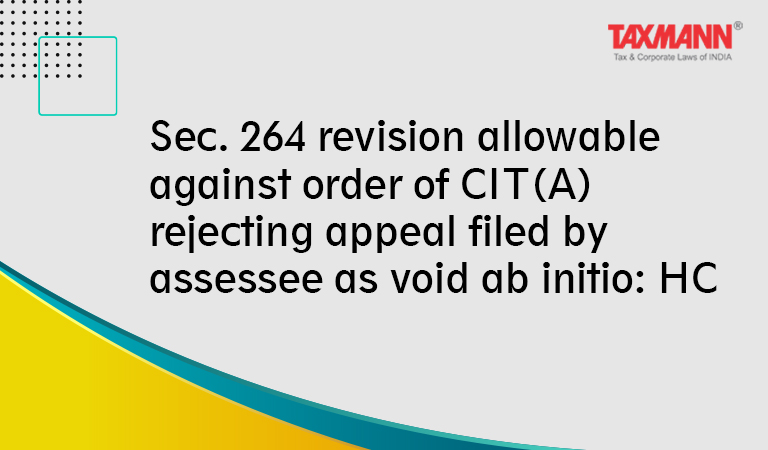Sec. 264 revision allowable against order of CIT(A) rejecting appeal filed by assessee as void ab initio: HC
- News|Blog|Income Tax|
- 2 Min Read
- By Taxmann
- |
- Last Updated on 7 September, 2021

Case details: S. Ravinder v. CIT - [2021] 129 taxmann.com 334 (Telangana)
Judiciary and Counsel Details
-
- M.S. Ramachandra Rao and T.Vinod Kumar, JJ.
- A.V. Siva Karthikeya for the Petitioner.
- J.V. Prasad, Sr. Standing Counsel for the Respondent.
Facts of the Case
Assessee had filed an appeal before the CIT(A) against the order of the Assessing Officer (AO). However, CIT(A) dismissed it by holding that the appeal filed was void ab initio and couldn’t be admitted as the assessee had failed to pay the admitted tax due.
Upon the rejection of the appeal, the assessee invoked the power of revision under section 264 and filed an application before CIT. In the said Revision preferred, the petitioner sought for reconsideration of the issue relating to proceeds from the sale of agricultural land by the petitioner’s father being subjected to Long Term Capital Gains, applying the provisions of Section 54F.
However, the CIT(A) rejected the revision application for reason that he can’t exercise the power of revision in respect of an order that has been made “subject of an appeal” to the Commissioner of Appeals or the Appellate Tribunal.
Assessee filed the writ before the High Court and contended that rejection of the Revision petition was without proper appreciation and understanding of the scope and application of provisions of section 264(4) of the Act.
High Court Held
The Telangana High Court held that any appeal, which is not accompanied either by the requisite Court fee, or any other mandatory payment required to be made as per the provisions of the relevant Statute, cannot be considered as a validly presented appeal, and such appeal would be non-est in the eye of law.
Once an appeal is considered as non-est in the eye of the law, any order impugned in such appeal cannot be considered as “subject of an appeal”, as there is no ascertainment or adjudication of the issues raised in the appeal on its merits.
Section 264(4) says that a Commissioner shall not revise any order if the order has been made the subject of an appeal to the Commissioner (Appeals) or to the Appellate Tribunal.
It should be noted that section 251(1)(a) stipulates that an appeal filed before the appellate authority, to be considered as disposed of, would require such order under challenge to be either confirmed, reduced, enhanced, or annulled. It goes without saying that the disposal is by considering the merits of the matter. In the present case, the order passed by CIT(A), in rejecting the appeal as void ab initio, cannot be considered as disposing of the appeal by any of the above modes specified. Thus, it couldn’t be said that the order of assessment is “subject of an appeal” placing embargo/ousting the jurisdiction of the CIT under section 264(4).
List of Cases Referred to
-
- Board of Revenue v. Raj Brothers Agencies [1973] 31 STC 434 (SC) (para 12)
- Chiranjilal Daga v. CIT [1978] 113 ITR 363 (Mad.) (para 13)
- C.C. Jayaram v. CIT [1994] 207 ITR 662 (Ker.) (para 14)
- Commissioner of Customs v. Indian Oil Corpn. Ltd. [2004] 136 Taxman 491/267 ITR 272 (SC) (para 16).
Disclaimer: The content/information published on the website is only for general information of the user and shall not be construed as legal advice. While the Taxmann has exercised reasonable efforts to ensure the veracity of information/content published, Taxmann shall be under no liability in any manner whatsoever for incorrect information, if any.

Taxmann Publications has a dedicated in-house Research & Editorial Team. This team consists of a team of Chartered Accountants, Company Secretaries, and Lawyers. This team works under the guidance and supervision of editor-in-chief Mr Rakesh Bhargava.
The Research and Editorial Team is responsible for developing reliable and accurate content for the readers. The team follows the six-sigma approach to achieve the benchmark of zero error in its publications and research platforms. The team ensures that the following publication guidelines are thoroughly followed while developing the content:
- The statutory material is obtained only from the authorized and reliable sources
- All the latest developments in the judicial and legislative fields are covered
- Prepare the analytical write-ups on current, controversial, and important issues to help the readers to understand the concept and its implications
- Every content published by Taxmann is complete, accurate and lucid
- All evidence-based statements are supported with proper reference to Section, Circular No., Notification No. or citations
- The golden rules of grammar, style and consistency are thoroughly followed
- Font and size that’s easy to read and remain consistent across all imprint and digital publications are applied



 CA | CS | CMA
CA | CS | CMA
